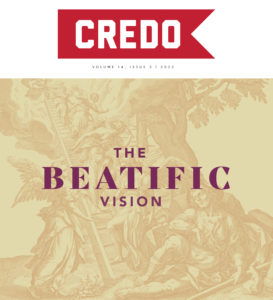
The Natural Desire of Human Beings for Beatitude
T homas Aquinas holds that human beings have a natural desire for beatitude with God in the next life. Yet the attainment of this beatitude is beyond natural human intellectual powers. Ultimate fulfillment for human beings thus seems to be something that is not attainable; yet, Aquinas argues that it is possible for human beings to reach their highest perfection in the beatific vision. Although this assertion is a religious doctrine, Aquinas does not appeal to religion to establish this point; rather, he uses philosophical argumentation in his Summa contra gentiles (SCG) to reason that the final end and ultimate happiness of human beings is theoretical knowledge of God’s essence, a knowledge that transcends their own natural human intellectual powers. In fact, human beings must have this transcendent knowledge in order to have ultimate fulfillment.[1]
homas Aquinas holds that human beings have a natural desire for beatitude with God in the next life. Yet the attainment of this beatitude is beyond natural human intellectual powers. Ultimate fulfillment for human beings thus seems to be something that is not attainable; yet, Aquinas argues that it is possible for human beings to reach their highest perfection in the beatific vision. Although this assertion is a religious doctrine, Aquinas does not appeal to religion to establish this point; rather, he uses philosophical argumentation in his Summa contra gentiles (SCG) to reason that the final end and ultimate happiness of human beings is theoretical knowledge of God’s essence, a knowledge that transcends their own natural human intellectual powers. In fact, human beings must have this transcendent knowledge in order to have ultimate fulfillment.[1]
An Intellectual Understanding of God
Perfect happiness, which can only be attained in the next life, consists in an activity of the highest part of human beings which is intellectual understanding. Ultimate fulfillment of the human beings as an intellectual understanding of God follows from Aquinas’s philosophical discussion of ends and teleology most evident in his SCG book three, though he also addresses this topic in other works such as his Commentary on the Sentences and his Summa theologica. Aquinas begins by arguing that every agent acts for an end. It is the end which impels or directs a thing to act. If there was no end, then one simply would not act. Aquinas next argues that every agent acts for a good. This is because “that toward which an agent tends in a definite way must be appropriate to it, because the agent would not be inclined to it except by virtue of some agreement with it. But, what is appropriate to something is good for it. So, every agent acts for a good (SCG 3.3).[2] From these two philosophical assertions — (1) that every agent acts for an end and (2) that every agents acts for a good — Aquinas will argue that there must be a final or ultimate end of all things and that this end will be the highest good.Perfect happiness, which can only be attained in the next life, consists in an activity of the highest part of human beings which is intellectual understanding. Share on X
There must be a final end because there cannot be an infinite number of ends. The ultimate end also has to be a good because all things are moved to obtain that which is their proper perfection. That which perfects something will be a good for that thing. Thus, we see the philosophical notion of teleology at work in Aquinas’s argumentation. All things are seeking that which is its own perfection. This is at work in nature. For example, one could describe the teleology of a rose as growing from a bud to a closed flower to reaching its perfection as it opens its pedals in beauty.[3] All things are ordered to an end. This end is the thing’s perfection and thus it is also a good. This will culminate in one final end for all things. Aquinas is able to conclude that the final end of all things is God because God is the highest good, a conclusion that Aquinas already established earlier in book one of the SCG. From these earlier conclusions, it naturally follows that all things are ordered to God as their final end. Thus, Aquinas can assert that “God is the first cause in the order of final causes, since He is the highest in the order of goods. Therefore, He is more the end of everything than is any proximate end” (SCG 3.17). Although Aquinas references two scripture passages at the end of this discussion in (Proverbs 16:4 and Rev. 22:13), his reasoning is philosophical.
Becoming and Imitating
From this, Aquinas continues in SCG 3.19-20 and says that all things seek (1) to become like their ultimate end, God, and (2) to imitate God’s goodness. Aquinas establishes the former on the principle that the effect seeks to become like its cause. As already established, God is the first cause and creator of all things. As the creator, God makes everything in his own likeness and thus all things seek to become like God. Further, because creatures receive their existence and goodness from their Creator, the first cause, all things strive to imitate God’s goodness. Since the end is a good and God is the ultimate end and highest good, all things seek to imitate this goodness.
The way, though, in which things seek to become like God and imitate God’s goodness will vary according to each thing’s proper operation or activity which is that thing’s perfection. For animals this perfection will be obtained through reproduction by which animals imitate God as cause. Human beings, however, have a higher power of operation than animals and are ordered to God through their intellects. As God is intellectual, human beings become like God through understanding. Because of this, the regression or return to one’s first cause or principle applies to human beings and not to animals, plants or minerals.Since the end is a good and God is the ultimate end and highest good, all things seek to imitate this goodness. Share on X
Up to this point, Aquinas has shown that God is the ultimate end of all things and that all things strive to become like God. Human beings imitate God through intellectual understanding. Yet, is the ultimate end of human beings to understand God? Perhaps humans, as the lowest in the hierarchy of intellectual beings, are too weak and limited and thus the highest level of human intellectual understanding is to understand not the highest intelligible (God), but a lower intelligible, such as we find in the accounts of the philosophers.[4] In SCG 3.25 Aquinas rejects such a conclusion on the basis that, even though human beings have the lowest place in the intellectual hierarchy, they still have a much higher place than things which lack understanding or intellect. Further, he asserts that even the smallest understanding of God is much more complete than even the perfect understanding of intelligibles lower than God.
This claim is further supported by the fact that the aim of first philosophy is to understand principles and causes, and most especially the first cause. Human beings naturally seek to know the causes of things, including the first cause. Human beings desire to know the causes of things and this desire cannot proceed on infinitely. It must, then, terminate in an end. But this end must be the highest end. If human beings were only able to attain knowledge of separate substances, for instance, the desire to know the causes of things could not be fulfilled. There would still remain a cause to be known, the first cause, God. However, the return to God in beatitude is not primarily because of the nature of knowing and the need to know all, including the most knowable or intellectual thing of all. It is because of the principle that all created things return to their cause. God is the final end of the human being because the human soul is directly created by God, not generated by parents as is the case for other animals.
A knowledge or understanding of God as first cause, however, transcends natural powers of human intellection. Insofar as God, the first cause, is above the effect, it would seem that, although this may be the ultimate end of human beings, it is not possible to attain but always remains something which is beyond human intellectual capabilities (SCG 3.51). Aquinas relies on the principle that nature does not give a desire in vain. Given this, it must be possible for human beings to know God and not to know him through some medium but to know him directly in his essence. It is only possible, however, in the next life by an elevation or an enhancement on the receptive powers of the human being’s intellect. A disposition is added to the intellect whereby the nature of the human person is elevated by the higher agent, God, in order to understand God. This disposition is what Aquinas calls the light of glory. By the light of glory, human beings participate in the beatific vision.
This excerpt is from the latest issue of Credo Magazine. Read the full article here!

